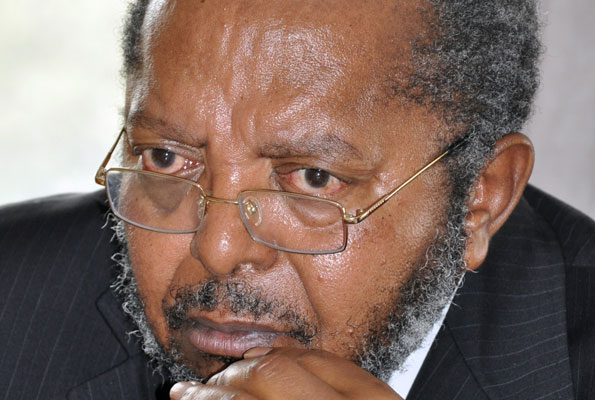In a few days, the Bank of Uganda probe will be resuming with its investigations over the controversial sale of several commercial banks.
Mutebile last week confessed that since he was appointed BoU governor, he had never disclosed his personal interest in the defunct National Bank of Commerce (NBC), until the bank he helped found, started to go through troubles that triggered its closure by BoU in 2012.
However, he admitted that he violated the Bank of Uganda by-laws, in particular regulation 7(1), which provides that every member of the board, officer or employee of the bank, shall be bound to disclose in writing his or her shareholding or other financial interest, if any, in any banking or credit institution carrying on business in Uganda.
“I had not formally declared my interests until the bank started having problems. When the matters of NBC came to the board. I declared my interests because of that I asked the deputy governor to be in charge.” Mutebile said.
National Bank of Commerce was closed on September 27, 2012 due to undercapitalisation, among other reasons. BoU took over the management of NBC in line with section 88(1) (a) and (b) of the Financial Institutions Act 2004 and subsequently placed NBC under liquidation, pursuant to section 89 (2) (f) and section 99 (1) of the Act.
BoU arranged for the purchase of assets and assumption of liabilities of NBC. On September 27, 2012, BoU and Crane Bank Limited signed a purchase of assets and assumption of liabilities agreement in which certain assets were transferred and liabilities assumed by Crane Bank Limited.
In Mutebile’s special audit, which is currently being interrogated by the probe committee, the auditor general queried the circumstances under which Crane Bank Limited was zeroed on to purchase NBC as well as what criteria BoU used to sell NBC’s assets worth Shs 9 billion below the book value.
In relation to Justine Bagyenda, the committee is probing whether her personal interests could have influenced her decision to close Global Trust Bank Uganda.
“We have information that Bagyenda’s sister, Edigold Monday, worked as an interim executive director of GTBU, but later resigned from the bank. We would like to get the connection between the bank’s troubles and Bagyenda’s personal relationship with Monday,” said an MP on the committee.
When the committee interfaced with the former directors of GTBU, Busiro East MP Medard Sseggona attempted to push them to disclose whether they had any misunderstanding with Bagyenda or Monday. They said they had none.
The former GTBU directors, who were led by Bayo Folayan, a former manager at GTBU, informed the probe committee that on July 3, 2014 there was a meeting at BoU and the regulator said their bank was not being run in accordance with corporate governance principles.
On July 4, 2014, this meeting was followed up with a letter from Bagyenda requiring GTBU to comply with the issues raised. However, before GTBU could convene the general meeting of the company to address the corporate governance issues raised since some required the intervention of shareholders, on July 25, 2014, BoU closed GTBU due to undercapitalization and corporate governance weaknesses, among other reasons.
The former directors of GTBU argue that BoU asked them to rectify their problems within 20 days, which is less than the 21 days in which they could issue a notice calling an extraordinary members’ meeting as provided under the Companies Act and Regulations.
“The financial condition of the bank did not justify the closure of the bank. The bank was not significantly undercapitalised and the going concern basis was not in doubt.” Folayan said, adding that GTBU directors should be compensated with Shs316 billion for the illegal closure.
A few days before Cosase began looking into the closure of defunct banks, Dr. William Kalema, a member of board of directors of Bank of Uganda (BoU), wrote a memo to BoU governor, Emmanuel Tumusiime-Mutebile, deterring him and his management from cooperating with the parliamentary investigation.
In the memo, Dr. Kalema argued that the probe would attract too much publicity, which would not only put the central bank in a vulnerable position, but would also invite unnecessary scrutiny of the bank’s officials’ reputations.
The memo will be investigated by the committee, and in addition, they will also be examining the circumstances under which Dr. Kalema qualified to become a member of the BoU board yet he had served as a director of a defunct bank.
According to section 53 of the Financial Institutions Act, no person can become a director of a financial institution without a written nod of approval of his or her compliance with the fit and proper test from the central bank.
According to documents before the probe committee, Dr Kalema was one of the seven listed directors of the Cooperative bank, which was shut by BoU in 1999 because of continued poor performance and non-compliance with regulatory capital adequacy requirements.
The law provides that for purposes of determining a person’s compliance with the fit and proper test, the central bank may look into the previous conduct and activities of the person concerned in business or financial matters and, in particular, into any evidence that the person was a director of an institution that has been liquidated or is under liquidation or management of the central bank or under receivership.
MPs are investigating whether Dr Kalema’s links with Dfcu, in part influenced circumstances under which Dfcu was most favoured to purchase the assets and liabilities of the defunct Global Trust Bank Uganda (GTBU) and Crane Bank Limited (CBL) at not so favourable terms but also in disregard of the law.
Similarly, Cosase is investigating how BoU hired and maintained MMAKS Advocates as its external legal advisors yet at the same time the firm’s partners are directors in some commercial banks.




